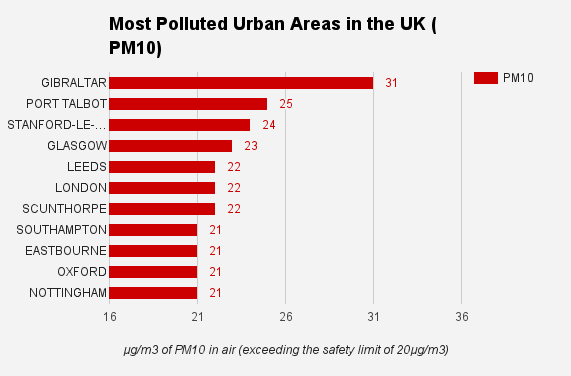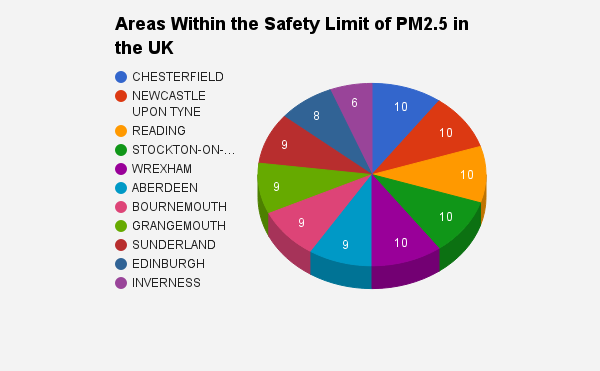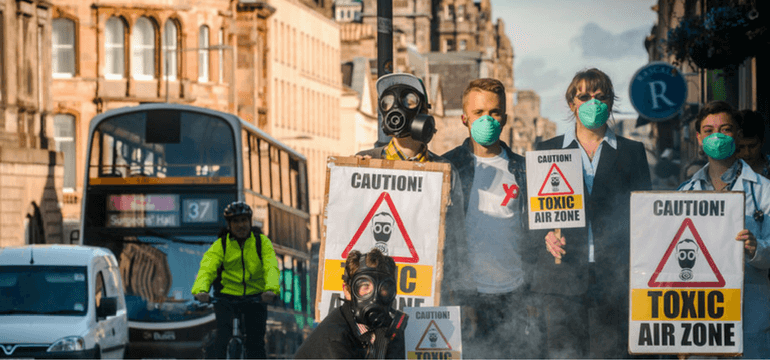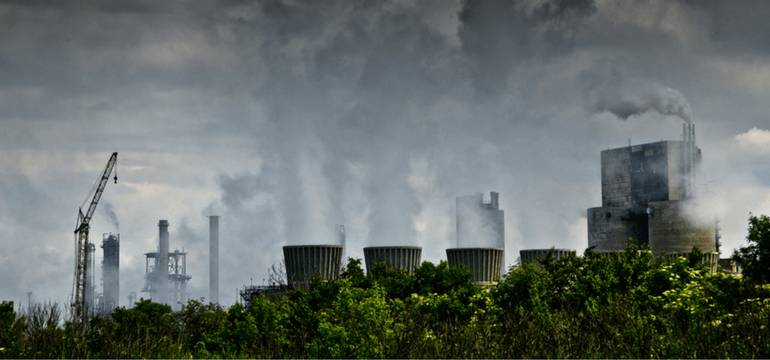- GreenMatch
- Blog
- Air Pollution UK
Post-Brexit Environmental Policies: Shifting the Dialogue to Air Pollution
The United Kingdom will need to employ more effective environmental policies post-Brexit in order to overcome the persisting problem of air pollution. Poor air quality currently costs the UK government £16 billion annually due to effects of poor health and reduced labour productivity.
An independent and more vigorous approach in curbing this predicament is crucial for the UK, as up until now 80-90% of her environmental policies were spearheaded by the European Union.
According to a report by the World Health Organization (WHO), eleven urban areas in the UK are currently above safe air pollution limits. The quality of air in an area is measured by levels of particulate matter, namely: PM2.5 and PM10. This constitute of particles such as dirt, soot, and smoke. It also includes gas emissions such as carbon dioxide, sulphur oxides, and nitrogen oxides.

The safety limit for PM2.5 is an annual average concentration of 10 µg/m3, whilst the safety limit for PM10 annual mean is 20 µg/m3. Thus, air pollution that has a PM2.5 score above 10µg/m3 and PM10 score above 20µg /m3 is not only hazardous but illegal.
The WHO report measured 51 cities in the UK, out of these, Gibraltar, is primarily the most polluted area in the UK .This is mainly due to ailing power stations in the area. This shows that the implementation of strategies to reduce emissions need to be strengthened, whilst compliance from industry bodies needs to be reinforced.
Additionally, only 10 cities in the UK were found to be within the safe limit of PM2.5. This is alarming as these particles are small enough to pass through the respiratory tract, resulting in a number of health problems making it a policy concern.

Typically, pollution occurs when a chemical, physical or biological substance mixes with natural air, and thereby altering the natural characteristics of the atmosphere. Indoor air pollution is sourced from household goods such as electronics, heating equipment and upholstered furniture.
On the other hand, power plants, industrial factories, and automobiles are common sources of outdoor air pollution. Whilst air pollution itself is unavoidable, as the air we breathe is constantly contaminated, the extent to which it occurs can be reduced in order to ensure environmental and health safety.
Based on standards endorsed by the EU, current UK environmental policies emphasise air pollution control rather than prevention. However, with Brexit in motion, it will be interesting to see how the UK will continue to enforce air pollution reduction strategies outside the EU.
The Adverse Effects of Air Pollution
Air pollution has an ill-effect on human health, welfare, and the state of our natural environment. It includes cost incurred by dwindling levels in labour productivity and health care expenditures.
The UK Department for Environment Food & Rural Affairs estimate that air pollution has causal effect on 29,000 deaths in the UK, as well as reduces life expectancy by 6 months on average at a cost of around £16 billion per annum.

Healthwise, when particulate matter is inhaled in high concentrations it can cause difficulties in breathing, asthma, and increased risk of heart disease. With long term exposure, the effects may lead to cancer, as well as damages to the immune, neurological, reproductive, and respiratory systems.
Environmentally, air pollution is a major contributor to global warming. The emission of sulfur dioxide and nitrogen oxides into the air produces acid rain. This in turn poses a threat to biodiversity, the depletion of the ozone layer, and the overall sustainability of the environment
Outlook on the UK’s Environmental Policies
The EU has played an immense role in the environmental policies and legislations in the UK prior to Brexit; as aforementioned, about 80-90% of the UK's environmental policies were derived from the EU.
This includes: waste management, air and water quality, and chemical regulations. Furthermore, the UK’s 2020 and 2030 interim targets for renewable energy, energy efficiency, and emissions reductions were driven by the EU.
Uncertainties of what the environmental policies will be now that UK is no longer part of the EU are highly prevalent amongst citizens, NGOs, organisations, and environmental think tanks.
Public opinion is that discarding EU led policies would impede on plans to improve UK’s air quality. Nevertheless, judging from that angle alone does not tell the complete story, as many variables might come to play in terms of how well post-Brexit policies might be implemented.
The UK Air Quality Strategy sets standards for regulations in reducing the pollution problem in the UK. One main objective is also directed to benefitting public health, improvement in the quality of life of the population, and helping to protect the environment.
With air quality highlighted as one of the biggest threats to public health, it is not expected that government will disregard the importance of the issue. Rather, we could see government moving towards closer collaborations with local authorities and private sectors to make long-term changes.
Ineffectiveness of Policies Tackling Pollution

Nonetheless, the speed at which such environmental policies are enforced has always been problematic. This is exemplified in 2015 when the campaign group ClientEarth took the UK Government to the supreme court with regards to breaching the EU Air Quality Directive.
Amongst the claims made by ClientEarth was that 90% of the country’s air quality zones have breached legally accepted levels since 2010 due to nitrogen dioxide emissions. These are toxic gases that are derived from diesel-powered vehicles largely affecting people living in the inner cities.
This was not the first time the UK government were confronted with excessive levels of nitrogen dioxide; as in 2014, the European Commission also took legal action against the UK over the same matter.
After a year long dispute, ClientEarth won the case, with lawyer Alan Andrews stating : “Because we believe that everyone has the right to breathe clean air, we took the UK government to court over air pollution. We also protect people from dangerous chemicals by defending EU laws on toxics, and campaign to make sure people can find out what’s in the products they use every day.”

Again, the UK is subject to out of date policies and lacks ambitious targets to tackle the problems of air pollution. The National Air Quality Standard, lastly updated in 2007, outlined the standards and objectives of reducing air pollution in the UK for England, Scotland, Wales, and Northern Ireland.
Accordingly, the government’s provision of a national plan by 2015 to confront air pollution, was enforced by the Supreme Court. The advocacy of strong organisations like the environmental protection UK was pivotal in bringing forth the extent of the effectiveness of the plans, and lack of support for the local measures that were included.
Subsequently, questioning the effectiveness of solving the problem particularly concerning the aftermath of Brexit.
Implications of Leaving the EU on Tackling Air Pollution
One of the concerns of many environmental activists are the fact that outside the EU, the UK will not be pressured into submitting reports and plans to mitigate pollution. This is also a concern in the case of missing the 2020 target for a reduction in emissions.
According to Full Fack UK, one of the side effects of Brexit will be the fact that UK power plants will not be legally bound by the EU’s pollution regulations. The EU directive is aimed at lowering the amount of pollutants emitted by new power plants, and cleaning up, or closing down old power plants by 2023; but won’t be effective in the case of the UK.

As a consequence of BREXIT, the government can choose to allow the continuous usage of old power plants. Thus, negatively affecting the extent of the pollution problems in the UK.
On the other hand, the UK contributes enormously to the EU budget, hence, one can conclude that the UK can fund itself in regards to environmental programmes and policies from the capital reserves from not being a member of the EU.
A particular case is the fact that the UK is one of the largest stakeholders in the European Investment Bank, which provides loans that go towards energy projects in the UK. With post-Brexit ongoing, the UK’s future with the EIB is uncertain, and that plays a role in constraining the solutions towards the problem of pollution.
The UK receives around £3.5 billion of funding from the main EU budget with the aim of tackling climate change and transition to a low carbon economy. Again, an investment of £300 million was allocated to the energy infrastructure project under the European Energy Programme.
Consequently, the extent to which the government will independently allocate such funds in tackling issues of environmental importance, in this case air pollution in the UK is undetermined. Therefore, it might not be a question of how able the government can focus financial resources to curbing the problem of air pollution, rather, how efficiently and effectively will it be.
It can be concluded that in order to curb air pollution, perhaps in more practical terms, the UK government needs to explore means of using their resources more efficiently. For instance, prioritising the development of renewable forms of energy, which are inexhaustible and do not pollute the atmosphere.
Also, as the UK is in the process of being autonomous from EU; this gives room for citizens, environmental organisations, and non-governmental organisations to actively engage and collaborate with the government in devising solutions.
Ultimately, implementation and collaboration may be what is required for the UK government to curb the problem of air pollution post-BREXIT.
We strive to connect our customers with the right product and supplier. Would you like to be part of GreenMatch?





